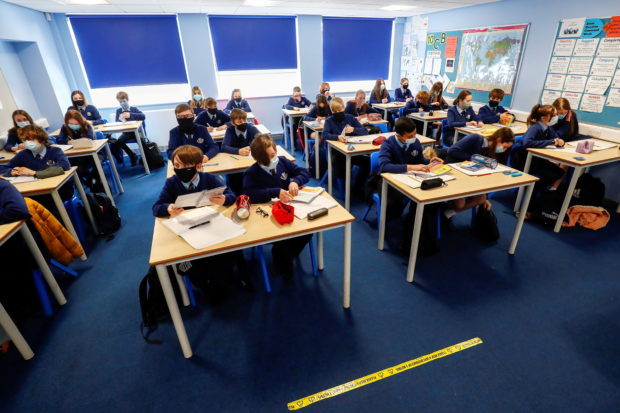
FILE PHOTO: Students attend a lesson at Weaverham High School, as the coronavirus disease (COVID-19) lockdown begins to ease, in Cheshire, Britain, March 9, 2021. REUTERS/Jason Cairnduff/File Photo
LONDON — COVID-19 infections in children in England rose in September after schools returned from summer holidays, helping to keep cases high even as there was a fall among adults, a large prevalence study showed on Thursday.
The REACT-1 study, led by Imperial College London, is the latest to find that more children are getting infected with COVID-19 following the reopening of schools at the start of September.
Infection numbers in Britain are currently much higher than in other western European countries, but have not risen above summer levels following the return of schools in England despite the higher infection rates in children.
The study found that prevalence in 13 to 17-year-olds was 2.55% between Sept 9-27, with prevalence in those aged 5 to 12 at 2.32%. Prevalence for every adult age group was estimated below 1%.
The study found that the epidemic was growing among those under 17, with an estimated reproduction “R” number of 1.18. An R number above 1 implies exponential growth, while a number below 1 implies the epidemic is shrinking.
The epidemic was estimated to be shrinking in 18-54 year olds, with an R number of 0.81, while the epidemic was broadly steady among those over 55.
While around 90% of over 18s have had one dose of COVID-19 vaccine, vaccination rates of children are much lower, and broad vaccination of those aged 12-15 only began last month.
“Prevalence was high and increasing in school aged children during September,” Paul Elliott, who led the study, told reporters.
“Increased vaccination uptake in school-aged children, and the unvaccinated or partially vaccinated adults will help reduce the potential for transmission.”
The study analyzed 100,527 valid swabs, and is intended to give an estimate of infection numbers that are unaffected by trends in people coming forward to be tested with COVID symptoms.
In daily figures, Britain reported 42,776 new COVID-19 cases on Wednesday, the highest number since mid-July, but health minister Sajid Javid played down the fluctuations in numbers.
“Overall things feel quite stable at this point. The numbers are a bit up, a bit down over the last few weeks,” he told Times Radio.
“Our primary defences against this virus are working.”